Your perfect chai masala blend starts with cardamom, the soul of chai, and cinnamon for sweet warmth. Add ginger for a spicy kick and cloves for aromatic intensity. Black pepper contributes subtle heat, while star anise offers exotic sweetness. Nutmeg brings nutty complexity, and coriander seeds provide citrusy undertones. Don't forget bay leaves for herbal depth. For a well-rounded flavor, consider fennel seeds to bridge earthy and sweet notes. By carefully combining these spices, you'll create a rich, complex chai that tantalizes your taste buds. Discover how each spice contributes to your ideal cup and elevate your chai experience.
Cardamom: The Chai's Soul
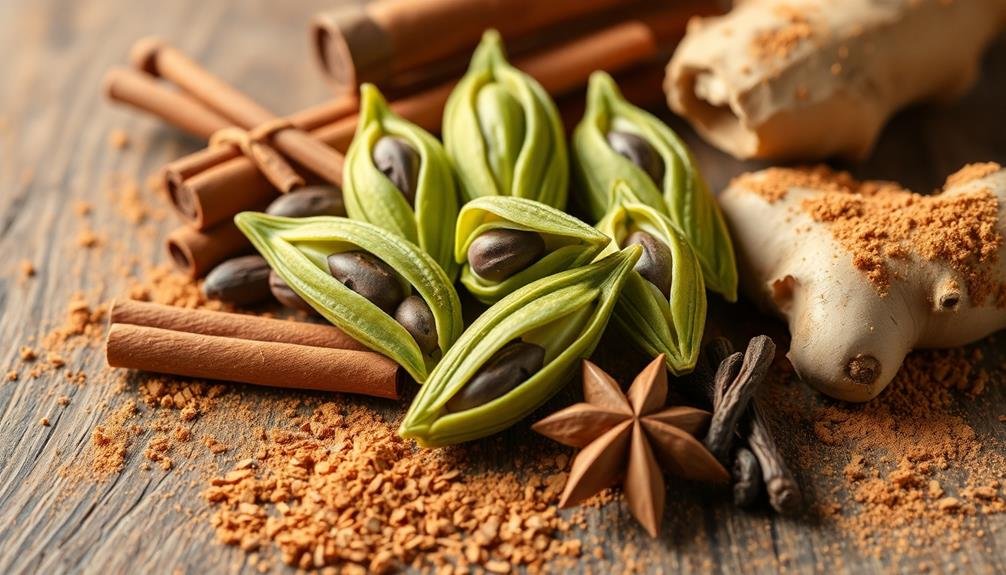
Cardamom is often called the soul of chai masala, and for good reason. This aromatic spice brings a unique, complex flavor profile to your chai blend. It's sweet yet spicy, with hints of mint and citrus that elevate the entire beverage.
When you're crafting your chai masala mix, opt for green cardamom pods. They're more potent and flavorful than their pre-ground counterparts. To release the full aroma, gently crush the pods before adding them to your spice blend. You'll need about 3-4 pods per cup of chai.
Cardamom doesn't just contribute to taste; it's also packed with health benefits. It aids digestion, freshens breath, and may even help lower blood pressure.
Its warming properties make it perfect for those chilly mornings or cozy evenings.
Cinnamon: Sweet Warmth
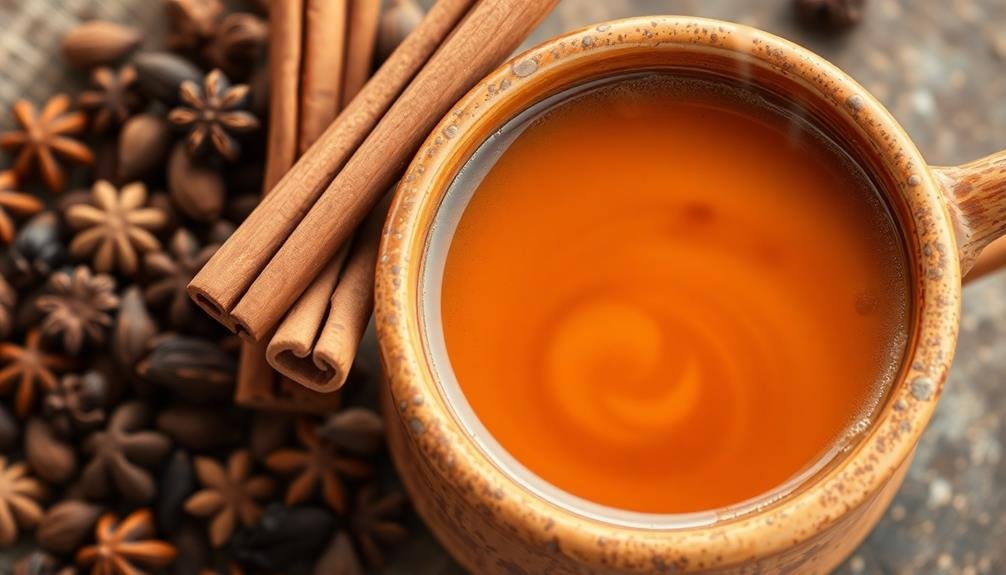
While cardamom brings complexity to chai, cinnamon adds a sweet warmth that's instantly recognizable. You'll find this beloved spice in almost every chai blend, and for good reason. Cinnamon's distinctive flavor profile combines sweetness with a subtle heat, creating a cozy sensation that's perfect for sipping on chilly days.
When selecting cinnamon for your chai, you have two main options: Ceylon and cassia. Ceylon, often called "true cinnamon," offers a delicate, floral taste with hints of citrus. It's milder and more expensive than its counterpart.
Cassia, the more common variety, provides a stronger, spicier flavor that holds up well in chai's bold mix of spices.
To incorporate cinnamon into your chai, use whole sticks rather than ground powder. This allows for a more gradual release of flavor and prevents the spice from becoming too overpowering.
Add one or two sticks to your chai mixture while it's simmering, adjusting the amount to suit your taste preferences. Remember, you can always remove the sticks earlier if you find the cinnamon flavor too strong.
Ginger: Spicy Kick

Ginger brings a fiery punch to chai masala, elevating the blend with its distinctive spicy-sweet flavor. This rhizome adds depth and complexity to your chai, while also offering numerous health benefits.
You'll find that ginger's warmth complements the other spices perfectly, creating a harmonious balance in your cup.
When selecting ginger for your chai masala, opt for fresh root whenever possible. You'll want to peel and grate it finely to release its full potential. If you're using dried ginger powder, remember that it's more concentrated, so you'll need less. Start with a small amount and adjust to taste.
Ginger's versatility shines in chai, as it pairs well with both black and green teas. It's known to aid digestion, reduce inflammation, and boost immunity.
You'll notice that ginger's heat builds gradually, leaving a pleasant tingle on your tongue long after you've finished your chai.
Don't be afraid to experiment with the amount of ginger in your blend. Some prefer a subtle hint, while others crave a more pronounced kick.
You'll soon discover your perfect balance, creating a chai masala that's uniquely yours.
Cloves: Aromatic Intensity
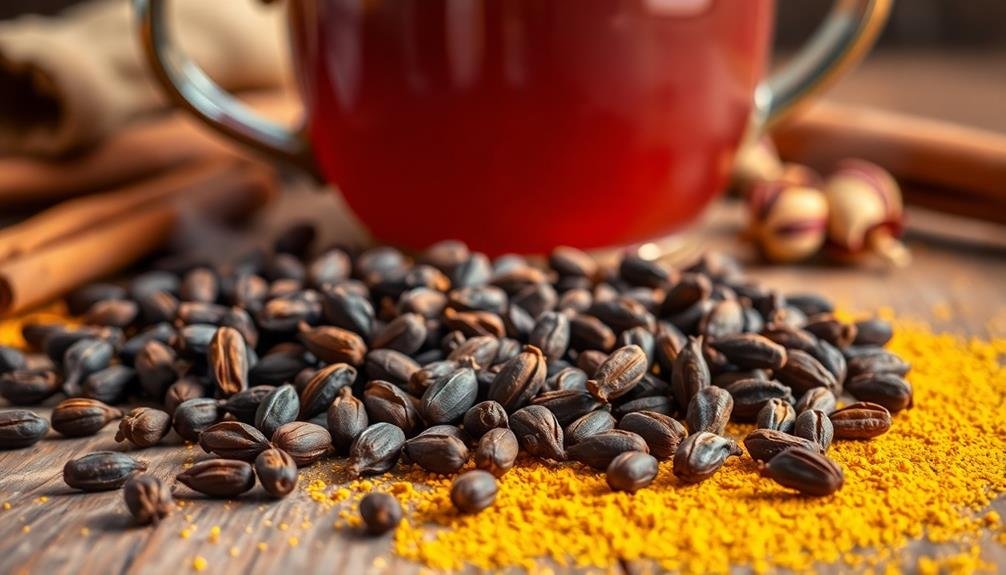
You'll find that cloves add warming and comforting notes to your chai masala, creating a rich, aromatic intensity.
These potent buds also offer antibacterial and antioxidant properties, potentially boosting the health benefits of your spiced tea.
Cloves play a vital role in balancing the sweetness in chai, contributing a subtle bitterness that enhances the overall flavor profile.
Warming and Comforting Notes
Among the warming spices in chai masala, cloves stand out for their powerful aromatic intensity. You'll immediately notice their distinct, pungent scent that adds depth and complexity to your chai blend. Cloves bring a unique combination of sweetness and heat, creating a warming sensation that's perfect for chilly days.
When you add cloves to your chai, you're not just enhancing its flavor; you're also benefiting from their potential health properties. Cloves are rich in antioxidants and have been used traditionally for their antimicrobial and anti-inflammatory effects. They can help soothe sore throats and may aid digestion, making your chai both comforting and potentially beneficial.
To get the most out of cloves in your chai, use them sparingly. Their strong flavor can easily overpower other spices if you're not careful. Start with just a few whole cloves per cup and adjust to your taste.
You can also grind them for a more intense flavor, but remember that ground spices lose their potency faster. For the best results, store your whole cloves in an airtight container away from light and heat.
Antibacterial and Antioxidant Properties
While cloves are prized for their aromatic intensity, they also pack a powerful punch when it comes to health benefits. These tiny, dried flower buds contain compounds that exhibit strong antibacterial and antioxidant properties. When you add cloves to your chai masala, you're not just enhancing the flavor; you're also boosting its health-promoting potential.
Cloves' antibacterial properties can help fight off harmful microorganisms in your body. They've been shown to be effective against various strains of bacteria, including those responsible for certain food-borne illnesses. This makes cloves a valuable addition to your spice blend, especially during cold and flu seasons.
As for antioxidants, cloves are a powerhouse. They contain eugenol, a compound that helps neutralize free radicals in your body. By including cloves in your chai, you're supporting your body's natural defense mechanisms against oxidative stress, which is linked to various chronic diseases and premature aging.
Moreover, cloves' antioxidant properties may contribute to improved digestion and liver function. They can help reduce inflammation in your body and potentially lower your risk of developing certain types of cancer. By incorporating cloves into your chai masala, you're not only creating a delicious beverage but also promoting your overall health.
Balancing Sweetness in Chai
Balance is key when crafting the perfect chai masala, and cloves play an essential role in achieving this harmony. These aromatic buds bring a unique intensity to your chai, countering the sweetness of other ingredients like cinnamon and cardamom.
When you're adding cloves to your blend, remember that a little goes a long way. Their strong, pungent flavor can quickly overpower the other spices if you're not careful.
To create a well-balanced chai masala, you'll want to use cloves sparingly. Start with just a few buds and adjust to taste. The goal is to achieve a subtle warmth that complements the other spices without dominating the flavor profile. Cloves also contribute to the overall mouthfeel of your chai, adding a slight numbing sensation that enhances the drinking experience.
When using cloves in your chai, consider these sensory aspects:
- The initial burst of intense aroma as you crush the buds
- The warming sensation on your tongue as you sip the brew
- The lingering, slightly sweet aftertaste that follows each sip
Black Pepper: Subtle Heat

You'll find that black pepper adds more than just a subtle kick to your chai masala.
It's known for its digestive aid properties, helping to soothe your stomach after a meal.
Additionally, black pepper enhances the overall flavor profile of your chai, bringing depth and complexity to the blend.
Digestive Aid Properties
Within the domain of digestive health, black pepper stands out as a powerful ally in chai masala. This spice doesn't just add a subtle heat to your brew; it's also working hard to support your digestive system. Black pepper stimulates the production of hydrochloric acid in your stomach, which is vital for breaking down food and absorbing nutrients efficiently.
When you sip your chai, you're not just enjoying a flavorful beverage; you're also giving your digestive system a boost. The piperine in black pepper enhances the bioavailability of other nutrients, meaning your body can absorb more goodness from the other spices and ingredients in your chai. This synergistic effect makes black pepper an essential component of a well-rounded chai masala blend.
Here's what you might experience when you include black pepper in your chai:
- A gentle warming sensation in your stomach
- Improved digestion and reduced bloating after meals
- Enhanced absorption of nutrients from your food
Enhances Overall Flavor
Beyond its digestive benefits, black pepper plays a key role in elevating the overall flavor profile of chai masala. Its subtle heat and distinctive aroma complement the other spices, creating a more complex and balanced taste. When you add black pepper to your chai blend, you'll notice it enhances the sweetness of cinnamon and the warmth of ginger without overpowering them.
Black pepper's pungent notes also help to cut through the richness of milk, making your chai more invigorating and less cloying. It adds depth to the brew, giving it a subtle kick that lingers on your palate. You'll find that the right amount of black pepper can transform a flat-tasting chai into a vibrant, multi-dimensional experience.
To get the most out of black pepper in your chai masala, use freshly ground peppercorns. This guarantees maximum flavor and aroma. Start with a small amount and adjust to your taste preferences.
Fennel Seeds: Licorice-Like Notes

Fennel seeds, with their distinctive licorice-like flavor, add a sweet and aromatic dimension to chai masala. These tiny, greenish-brown seeds aren't just for looks; they're packed with essential oils that contribute to the complex flavor profile of your perfect chai blend.
When you crush or grind fennel seeds, you'll release their full potential, infusing your chai with a subtle sweetness and a hint of invigorating anise.
You'll find that fennel seeds:
- Impart a cooling sensation on your tongue, balancing the warmth of other spices
- Create a bridge between the earthy and sweet flavors in your chai
- Leave a pleasant, slightly minty aftertaste that lingers after each sip
As you experiment with fennel seeds in your chai masala, you'll discover they're not just about flavor. They're also known for their digestive properties, making your chai both delicious and potentially beneficial for your gut health.
Don't overdo it, though – a little goes a long way. Start with a small amount and adjust to your taste preferences. You'll soon find the perfect balance that elevates your chai to new heights of flavor complexity.
Star Anise: Exotic Sweetness
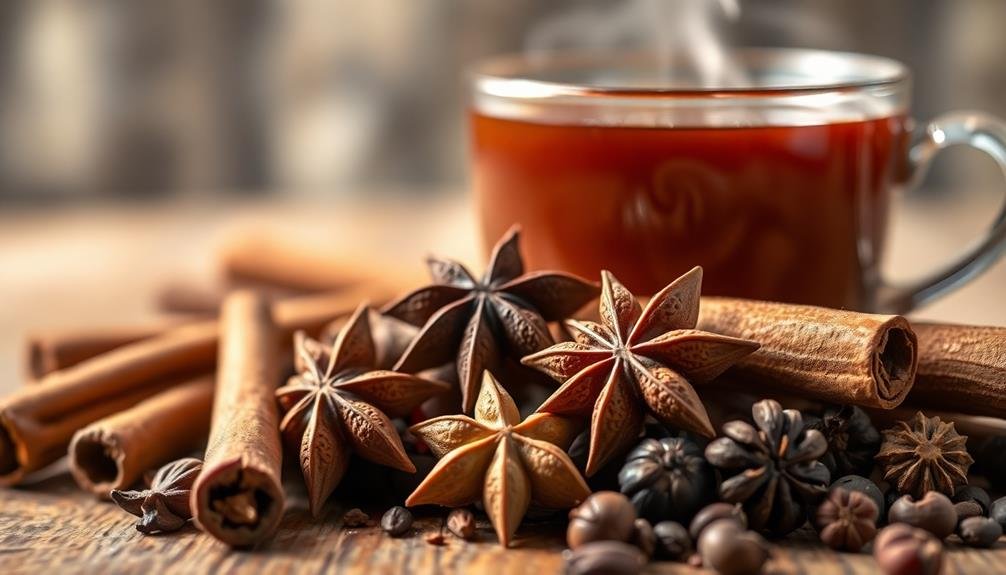
Moving from fennel's licorice notes, we encounter the visually striking star anise. This beautiful, star-shaped spice adds an exotic sweetness to your chai masala blend. You'll find its flavor reminiscent of licorice but with a more intense, sweeter profile. Star anise isn't just pretty; it's packed with essential oils that contribute to chai's warmth and complexity.
When you're using star anise in your chai, remember that a little goes a long way. One or two star points are often enough for a pot of tea. You can add it whole or ground, depending on your preference. Whole stars infuse more slowly, allowing for a gentler flavor development, while ground star anise releases its essence more quickly.
| Aspect | Whole Star Anise | Ground Star Anise |
|---|---|---|
| Flavor | Subtle, develops | Intense, immediate |
| Infusion Time | Longer | Shorter |
| Storage Life | 1-2 years | 6-12 months |
| Versatility | Can be removed | Blends completely |
| Visual Appeal | High | Low |
Star anise pairs wonderfully with cinnamon and cloves in your chai blend. It's also a key ingredient in Chinese five-spice powder, demonstrating its versatility beyond chai. You'll find that incorporating star anise elevates your chai masala, adding depth and a touch of sweetness that balances the other spices beautifully.
Nutmeg: Nutty Complexity

Have you ever wondered what gives chai its distinctive nutty undertone? It's likely the nutmeg, a spice that adds depth and complexity to your chai masala blend. Nutmeg comes from the seed of the Myristica fragrans tree, native to Indonesia's Banda Islands. When ground, it releases a warm, slightly sweet aroma that perfectly complements the other spices in your chai.
Adding nutmeg to your chai masala will:
- Enhance the overall flavor profile with its unique combination of sweet and savory notes
- Provide a subtle warmth that lingers on your palate after each sip
- Create a rich, creamy texture that makes your chai feel more indulgent
To use nutmeg in your chai, grate it fresh just before brewing. A little goes a long way, so start with a small amount and adjust to taste.
You'll find that nutmeg pairs exceptionally well with cinnamon and cardamom, creating a harmonious blend of flavors. It's not just about taste, though. Nutmeg also offers potential health benefits, including improved digestion and cognitive function.
Coriander Seeds: Citrusy Undertones

While nutmeg adds depth to your chai, coriander seeds bring a bright, citrusy note that lightens the blend. These small, round seeds come from the cilantro plant and offer a complex flavor profile that's both sweet and slightly tangy.
When crushed or ground, they release a lemony aroma that'll entice your senses before you even take a sip.
To incorporate coriander seeds into your chai masala, you'll want to lightly toast them in a dry pan before grinding. This process enhances their flavor and makes them easier to pulverize. Use about 1-2 teaspoons of whole seeds for every 4 cups of chai.
Once ground, they'll mix seamlessly with other spices, adding a subtle but distinctive layer to your brew.
Coriander seeds pair exceptionally well with cardamom and ginger, creating a harmonious balance of warmth and freshness. They're also known for their digestive benefits, making them a perfect addition to your post-meal chai.
Bay Leaves: Herbal Depth
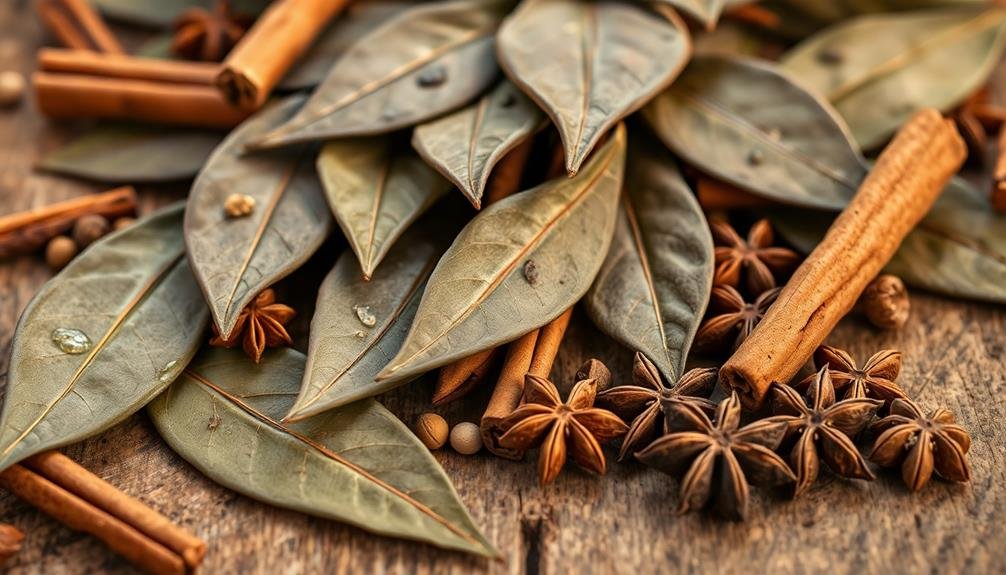
A handful of bay leaves can elevate your chai masala from good to exceptional. These aromatic leaves add a subtle herbal depth that complements the other spices in your blend. When you're crafting your chai masala, don't overlook the power of bay leaves to enhance the overall flavor profile.
Bay leaves bring a unique combination of flavors to your chai:
- A gentle minty coolness that lingers on the palate
- A slight bitterness that balances the sweetness of other spices
- A woody, earthy aroma that adds complexity to the blend
To incorporate bay leaves into your chai masala, crush them slightly before adding them to your spice mix. This releases their essential oils and guarantees that their flavor infuses evenly throughout your chai. Remember, a little goes a long way – two to three leaves per batch of chai masala is usually sufficient.
When you're brewing your chai, let the bay leaves steep along with the other spices to fully extract their flavor. You'll notice a subtle but distinct herbal note that rounds out the taste of your chai, making it more complex and satisfying.
Don't forget to remove the bay leaves before serving, as they can be unpleasant to chew on.
Frequently Asked Questions
How Long Can Homemade Chai Masala Spice Blend Be Stored?
You can store your homemade chai masala spice blend for up to 6 months in an airtight container. Keep it in a cool, dark place to maintain freshness. For best flavor, use it within 3-4 months.
Can I Use Ground Spices Instead of Whole Ones?
Yes, you can use ground spices instead of whole ones for your chai masala. However, you'll lose some freshness and flavor. If you do opt for pre-ground spices, make sure they're fresh and store your blend in an airtight container.
What's the Best Milk-To-Water Ratio for Chai?
You'll find the ideal milk-to-water ratio for chai is typically 1:1. However, you can adjust it to your taste. For a creamier chai, use more milk. For a lighter version, increase the water content. Experiment to find your perfect balance.
Are There Caffeine-Free Alternatives to Black Tea for Chai?
Yes, you can make caffeine-free chai using herbal alternatives. Try rooibos, honeybush, or tulsi as your base. These options offer similar flavors and health benefits. You'll still get that comforting chai taste without the caffeine buzz.
How Can I Adjust the Spice Blend for a Less Sweet Chai?
To make your chai less sweet, you'll want to reduce or omit sweeteners. Instead, focus on enhancing savory spices like cardamom, ginger, and black pepper. You can also add more cinnamon for natural sweetness without sugar.
In Summary
You've now got the key ingredients for a perfect chai masala blend. Don't be afraid to experiment with proportions to suit your taste. Remember, the beauty of chai lies in its adaptability. Whether you prefer a spicier kick or a sweeter note, you're now equipped to create your signature blend. So go ahead, grind those spices, brew that tea, and savor the rich, aromatic experience you've crafted. Your perfect cup of chai awaits!

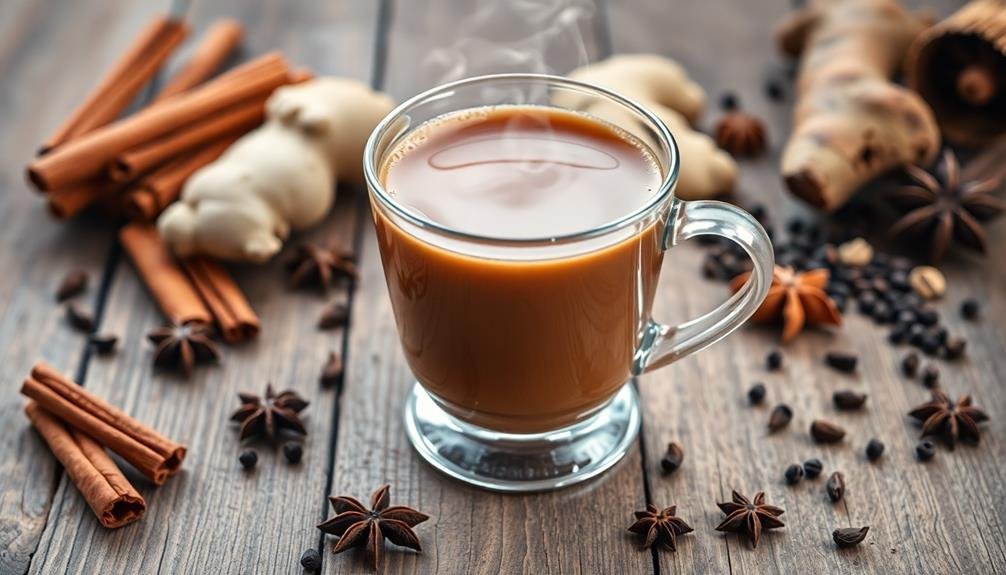



Leave a Reply